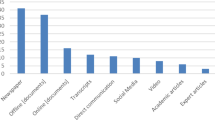Abstract
What follows from the suggestion to pay attention to what is in-between science and politics? Karen François’s paper “In-between science and politics” follows Latour in arguing for the need for political theory to get out of the Platonic cave that it still inhabits. Political theory needs to be brought into the wild through empirical studies of how science and politics in fact intermix. And the Latourian proposition needs to be strengthened by focusing on the embodied knowledges that enable situated objectivities to emerge. Though worthwhile, these arguments are weakened by a superficial treatment of political theory and by a lack of attention to the difficulties involved in combining Latourian actor-network theory with the “strong objectivity” of standpoint theory. Most problematically the paper purports to define as an agenda (exploring the in-between of science and politics) what whole fields of inquiry have already been in full swing exploring for quite a while. The ‘turn to ontology’ in STS and social anthropology and the development of ‘empirical philosophy’ suggests what might be at stake in such explorations.
Similar content being viewed by others
References
François K. (2011) In-between science and politics. Foundations of Science, 16(2–3): 161–171
Henare, A., Holbraad, M., Wastell, S. (eds) (2007) Thinking through things: Theorising artefacts ethnographically. Routledge, London and New York
Irwin A. (1995) Citizen science: A study of people, expertise and sustainable development. Routledge, London and New York
Jasanoff, S., Martello, M. L. (eds) (2004) Earthly politics: Local and global in environmental governance. MIT Press, Cambridge
Jensen C. B. (2003). Latour and Pickering: Post-human perspectives on science, becoming and normativity. In D. Ihde & E. M. Selinger (Eds.), Chasing technoscience: Matrix for materiality (pp. 225–241). Bloomington, In: Indiana University Press.
Jensen C. B. (2004) A non-humanist disposition: On performativity, practical ontology and intervention. Configurations 12(2): 229–261
Jensen C. B. (2006) Review essay: Experimenting with political ecology. Human Studies 29: 107–122
Jensen C. B. (2010) Ontologies for developing things: Making health care futures through technology. Sense Publishers, Rotterdam
Jensen C. B., Gad C. (2008) Philosophy of technology as empirical philosophy. In: Olsen J. B., Selinger E. M., Riis S. (eds) New waves in philosophy of technology. Macmillan, New York, pp 292–314
Jensen, C. B., Rödje, K. (eds) (2009) Deleuzian intersections: Science, technology, anthropology. Berghahn Press, Oxford
Latour B. (1988) The pasteurization of France (with irreductions). Harvard University Press, Cambridge, MA and London
Latour B. (1993) We Have never been modern. Harvester-Wheatsheaf, New York
Latour B. (1999) Pandora’s hope: Essays on the reality of science studies. Harvard University Press, Cambridge, MA and London
Latour B. (2004) Politics of nature: How to bring the sciences into democracy. Harvard University Press, Cambridge, MA and London
Latour B. (2007) Turning around politics: A note on Gerard de Vries’ paper. Social Studies of Science 37: 811–820
Leach M., Scoones I., Wynne B. (2005) Science and citizens: Globalization and the challenge of engagement. Zed Books, London
Mackenzie, D., Muniesa, F., Siu, L. (eds) (2007) Do economists make markets? On the performativity of economics. Princeton University Press, Princeton
Miller C., Edwards P. (2001) Changing the atmosphere: Expert knowledge and environmental governance. MIT Press, Cambridge, MA
Mosse D. (2004) Cultivating development: An ethnography of aid policy and practice. Pluto Press, London and Ann Arbor, MI
Ong A., Collier S. J. (2005) Global assemblages: Technology, politics, and ethics as anthropological problems. Blackwell, Malden, MA
Oudshoorn N., Pinch T. (2005) How users matter: The co-construction of users and technology. MIT Press, Cambridge, MA
Pickering A. (1995) The mangle of practice: Time, agency and science. University of Chicago Press, Chicago, IL
Pickering, A., Guzik, K. (eds) (2008) The mangle in practice: Science, society and becoming. Duke University Press, Durham, Nc
Smith B. H. (2005) Scandalous knowledge: Science, truth and the human. Edinburgh University Press, Edinburgh
Woolgar S. (1991) Configuring the user: The case of usability trials. In: Law J. (eds) A sociology of monsters: Essays on power, technology and domination. Routledge, London, pp 57–102
Author information
Authors and Affiliations
Corresponding author
Rights and permissions
About this article
Cite this article
Jensen, C.B. What if We were Already in the In-Between? Further Ventures into the Ontologies of Science and Politics. Found Sci 18, 331–336 (2013). https://doi.org/10.1007/s10699-011-9268-1
Published:
Issue Date:
DOI: https://doi.org/10.1007/s10699-011-9268-1




